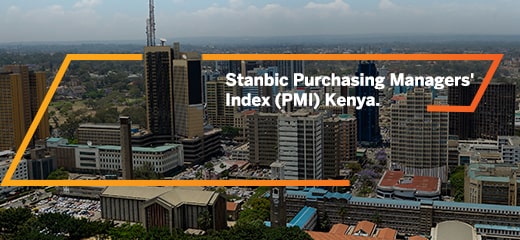Business conditions decline at softer pace in March
Key findings
Key findings
- Output and new orders fall for second month
running... - ...but rates of decline soften from February, and
jobs increase - Input cost inflation remains severe as exchange
rate weakens
The Kenyan private sector economy continued to run in contraction territory in March, latest survey data showed, as business activity and new orders decreased for the second month running amid rising prices and cash flow problems. However, rate of declines lessened somewhat from the initial downturn in February, while businesses signalled renewed uplifts in employment and purchasing.
Nevertheless, inflationary pressures underlying the deterioration in economic conditions remained exceedingly sharp, with around 30% of businesses reporting an uptick in purchase prices linked to problems accessing US dollars and a worsening of exchange rates. The latest increase in costs sent output price inflation to a five-month high, while related mentions of imported goods shortages led firms to seek safety stockpiles.
The headline figure derived from the survey is the Purchasing Managers’ Index™ (PMI). Readings above 50.0 signal an improvement in business conditions on the previous month, while readings below 50.0 show a deterioration.
At 49.2 in March, the headline index signalled a slight deterioration in business conditions at the end of the first quarter of the year, and the second monthly contraction in a row. However, the rate of deterioration lessened notably from February, when the index dropped to a six-month low of 46.6.
The softer decline in business conditions reflected weaker falls in both output and new orders during March. While many respondents continued to see demand fall due to high prices and a lack of money in circulation, others saw a recovery in customer orders, particularly from abroad.
Sector data signalled that the latest contractions in output and sales were centred on wholesale & retail companies. By contrast, manufacturing, agriculture, construction and services recorded expansions in both metrics.
At the same time, the latest data signalled renewed rises in employment and purchasing in March, although growth in both cases was only mild. The rise in purchasing reflected some efforts to build inventories of inputs, as firms reported that difficulties accessing US dollars had led to a shortage of commodities and longer delivery times.
Weakness in the Kenyan shilling against the US dollar meanwhile drove another marked increase in purchasing costs. Around 30% of firms saw purchase prices rise since February, with increased taxes and fuel prices also cited. Overall cost inflation remained among the highest seen since the survey began in January 2014, leading firms to raise their output prices at the quickest rate in five months.
Finally, while the outlook for future business activity dropped to a three-month low in March, it remained strong and above the level seen throughout much of 2022. Firms often commented on plans to open new branches and increase capacity over the coming year, amid hopes that demand will begin to recover.
Comment
Mulalo Madula, Economist at Standard Bank commented:
"Although the pace of deterioration has slowed, Kenya saw business conditions continue to decline in March, as the PMI remains just below 50. Both output and new orders fell in March, particularly in wholesale and retail trade, due to lower demand, especially as price pressures have accelerated.
Employment and purchases also increased slightly, while backlogs of work rose, prompted by agriculture, as some panellists noted that unfavourable weather conditions had reduced output. The World Meteorological Organization suggested that the La Niña weather pattern, that normally adversely affects East Africa, is slowly waning, with forecasts predicting a 90% chance of transitioning to ENSO-neutral and the possibility of El Nino gradually developing, reaching a significantly higher probability of around 55% in June-August which may keep growth in the large agriculture sub-sector volatile. Overall, confidence plunged to its lowest level in three months, but businesses remained optimistic about Kenya's business environment, especially in the manufacturing sector."
Contact
Mulalo Madula
Economist
Standard Bank
Tel: +27 (0)11 415 4552
[email protected]
Catherine Ngina Njoroge
Marketing and Communications
Stanbic Bank
Tel: +254 722 664 992
[email protected]
David Owen
Senior Economist
S&P Global Market Intelligence
T: +44 1491 461 002
[email protected]
Sabrina Mayeen
Corporate Communications
S&P Global Market Intelligence
T: +44 7967 447 030
[email protected]
